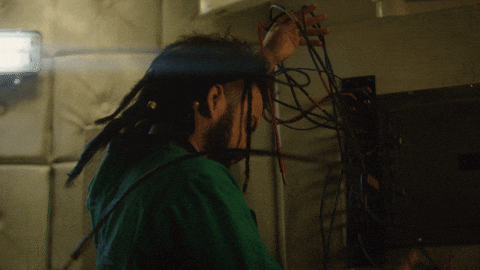
Holy shit. I can’t believe it but I’ve just finished my 9th module, Computer and Mobile Networks (CAMN), from the online master’s degree at the University of York 😱😱😱. Now all I have left is the research project proposal (report/essay) and the infamous Individual Research Project AKA IRP AKA the dissertation.
I’M SO PUMPED! I handed the assignment in last night at 2 am and as per usual I had a adrenalin and endorphins rush and couldn’t get to sleep until around 4 am. Because this was me:

I know in every review I’m like moaning and stuff and then I go and continue the course like I’m enjoying this sickening torture of myself but I have to admit… this degree is really difficult, really gruelling, takes up ALL of my time (repeats broken record) but dayyyym has it been rewarding!
After the disastrous Computer Architecture and Operating Systems (CAOS) which I absolutely hated I got the results for it and got a distinction and the highest grade I have ever gotten in any exam. Like wtf? Where is the justice in that? 🤣.
Anyways, more good news to share, CAMN was really fun and I really enjoyed it (which equates to scraping a pass – the more I enjoy it the lower mark I get). In this review, I am going to walk through briefly what I learnt, what helped me, how I felt about it and some tips and advice.
Computer Networks
As the module name suggests the topic was focused initially on Computer Networks. The TCP/IP model is based on the abstract Open Systems Interconnection Model(OSI) Layer Model. TCP/IP is basically a set of “rules” that guide devices on how to connect and communicate with each other over a network.
It can be thought of as a postal system for the internet. A postal system ensures that a package or letter gets delivered from one location to another, and similarly, TCP/IP provides a set of rules and standards for data to be transmitted reliably between computers on the internet, with the address, stamps and everything. Whatever it needs to get from A to B to C.

So these “rules” I spoke about are the different protocols. Thus we learnt a lot about the different types of protocols each layer requires and a bit about the protocols and what they do and are useful for. It was a bit confusing at first but when I started to do the assignment it all clicked into place suddenly.
I’ve always loved the internet and I’ve been running websites since I was about 13 which means I had to set up DNS servers (connect my Host to Domain) and my MX records (Directs Email to Server) which I had no idea what they were or why. I just knew if I did X then I achieved Y. This module has helped me understand what the hell my websites are doing in the back end, how people were accessing my website on the internet, and how I receive all my emails, which is sick! It’s basically just magic. If you love the internet, you will find it fascinating how much shiz you can get from a bunch of wires.

Each week we are taught each “layer” of the TCP/IP model and read a few chapters from the book (see the pattern? same process for each module btw 😅). The book is one of the better books. A decent, informative and interesting read. In some sections, it walks you through the analogies to understand the abstraction of how data moves through the layers. This makes it easier to digest as you can relate it to common processes.
The book they get us to read is:
Mobile Networks
Then we learnt a little bit about wireless connectivity and mobile networks, 5g and how these connect to the internet and to each other… we don’t really “learn” as such we just watch a few videos on it and read a few chapters on it. If you’re interested you can dig more into areas as you see fit! Some people on our course said the mobile networks part was short and outdated and they are probably right but I know too little to point out the discrepancies in the course content 🙈
I’ve forgotten what else we learn about but basically, we go through each layer of the TCP/IP model, learn how devices inter-connected with each other, learn about protocols that do this, learn about the security measures to encrypt data, authorisation and then a brief bit about ethics.
Course Tasks
There are also some short and simple programming tasks to build or alter some snippets of code that perform the User Datagram Protocol (UDP) and Transmission Control Protocol (TCP) functions in Java and then mostly quizzes and sharing 250-word summaries of our opinion on concepts or topics we learn each week. We also had to use this packet analysing tool called Wireshark. I briefly opened it and followed step-by-step the first instructions and then ignored everything else “Wireshark” related after that since I’m really slow at learning and understanding new information (I think I’m dyslexic) and this tool was slowing me down. Maybe it was super useful – there was a section with 10 different tasks relating to this tool but I just didn’t have enough time 😭 I would say I could go back and look into the areas I missed but my next module has started today and it’s non-stop so that isn’t happening any time soon. So yeh, I did the quizzes and some of the programming assignments and mostly read the book and watched youtube videos 🙂
This time they also gave us week 8 off which was great as back when I first started we were studying weeks 1-8 and the assignment was expected to fit in…. somewhere? Who knows where. But this time we had no learning material in the last week which gave us some space. To be fair I did not study in-depth most of week 7 (Ethics/Legal) either as I, unfortunately, ran out of time. It was quite a hard module since there were many concepts you needed to get your head around and these all somehow interlinked. I had run out of steam anyways, there were too many acronyms to learn. So I started to use ChatGPT to help clarify the more complicated concepts and keep on top of the acronyms.
ChatGPT
If you’ve not heard of ChatGPT then you are missing out! It came out in November and I am so gutted it was not there from the beginning of studying. I’ve been using it as my study partner for this entire module and I can tell you it’s AMAZING. Who needs all those useless teachers when you have ChatGPT to answer your questions straight away and in much depth and quality of the books!
This is me asking ChatGPT to turn everything into a “common analogy” 🤣

I’ve been using it to clarify my understanding, re-explain concepts in analogies, simplify concepts and link disparate concepts together and give quick brief pros/cons and comparisons – it’s basically been a blessing to online studying. I found it really engaging that I could instantly ask questions I’d want to ask my tutor. The only issue is sometimes it tells you the wrong things and sometimes the links it shares are broken or outdated since it’s running on information from 2021 backwards. I also used it to help with my assignment by formulating a framework and summarising what I needed to cover for each section. I did test it to see if it could write my assignment but it was quite basic and I didn’t want to “cheat”.
The quality of ChatGPT was limited to the stuff it finds online rather than actual research papers. It’s good for factual things so I kind of just used it to supplement my knowledge gap, reword paragraphs and verify what I was saying wasn’t completely dumb. I totally recommend it as a study buddy!
The Assignment
This module was assignment based. What’s weird is the last cohort got to program a TCP/IP in Java… whilst we did no coding whatsoever! Ours was more of a theoretically “design” this sort of assignment. I think they’re changing up the assignments now to make them fair and less predictable.
The assignment was tough. The main reason was we had spent 7 weeks learning about this TCP/IP model and all the layers which are very abstract when for our assignment we had to design a Network Infrastructure Design from scratch (somehow). So it was a huge gap from concept and abstract to full-on technical design.
Luckily, I wasn’t alone and everyone had similar feelings however, over the last week studying for the assignment – I actually learnt SO MUCH MORE than I did over the past 7 weeks from the module content and reading. I kept pretending I was designing the infrastructure for my growing start-up lol.
It was a lot but I enjoyed it as there was a “practical” task involved but most of my time was spent learning, understanding how to do it, and what it was asking of me rather than the actual “doing”. Because I had a reason to learn, read and research (to complete my assignment) I had more of motivation to do it which meant I was more engaged in the task.
So, I ended up working on this assignment for more than 15 hours x 8 days. I had to take a week off work again and I still was working on it up until the very last minute – I probably need to manage my time better but there was so much to cover and too little time. I started the assignment about 2 weeks in advance and still didn’t finish it as well as I’d liked but alas what’s done has been done. I re-read it after I handed it in and some of my paragraphs don’t make sense or match up with the design but I was so tired I gave up 😅
Tips
Most of the tips are the same for each assignment thus if you read the tips bit in Research Methods post it would also apply to this assignment. I now just go and read that blog when I get stuck and follow my own guide lol.
If you want good grades focus on the Summative as soon as it comes out. You don’t need to start it straight away but definitely start analysing it ASAP. Print it out, read it, and highlight it. Then go back to the weeks you’ve not studied and skim the content to see if it’s relevant or not. It will save you the time and stress of trying to scramble time to learn, research and write them in the last week.
I’m one of those people who enjoys learning new things thus I keep wanting to just study every single topic in the modules otherwise I also feel FOMO. I know I’m probably not spending my time wisely but I’m not that smart and I thrive off that last-minute panic mode it’s like stress is my fuel lol. I’ve realised that that is just me and who I am and how I work. But I do know people in my cohort who get the highest grades are the ones who start early and focus solely on the assignment and exams rather than trying to go through all the content.
Conclusion
Computer and Mobile Networks were enjoyable topics which I was quite pleasantly surprised about and the assignment was also quite fun. I just don’t think there were enough hours in the day to complete the assignment to the best of my ability even with the entire week off because module content barely contributed to the assignment, so it required a lot of self-learning. I believe there should have been an entire module itself before even attempting to do the assignment. Nevertheless, I tried my best and I’m happy with the amount I learnt in such a short space of time. The new order of preference of modules goes as follows from favourite to least favourite:
- Applied AI
- AI/ML
- Big Data Analytics
- Algorithms and Data Structures
- Computer and Mobile Networks
- Advanced Programming
- Research Methods
- Software Engineering
- Computer Architecture and Operating Systems
I hope you enjoyed this blog post and keep your comments coming – I love them!

Hi Bexa!
Just wanted to leave a comment and say thank you so much for doing this blog. It’s so valuable reading about your personal experiences in this program. I’m still deciding if it’s worth it for me.
15 hours x 8 days for an assignment! That’s a crazy amount of work. Kudos for getting through it.
Do you have a specific career in mind in Artificial Intelligence you want to pursue? Do you think this program at University of York will help you get there?
Hello Christine,
Thanks for reading through my rollercoaster of emotions haha. Please bear in mind this is how long it personally takes me as I have difficulties with studying/learning/writing. So for someone who is more able it will take less time.
This program increased my confidence to apply for entry-level Data Engineering jobs which I applied to 1/3 through the degree and achieved – so yes in a way it helped me get there but only mentally preparing me not technically. In terms of areas in AI, I’m not sure yet, but I do know I want to focus on using AI to help women transition to technical careers for my dissertation. So I’m hoping to use all the skills I’ve learnt to pursue personal projects rather than go into AI as a field.
Hi Bexa!
Thank you for all the valuable information.
I wanted to ask, do exam grades always take 25 working days to become available? Is this the rule for every module? In your experience how hard is it to get a 50/100 in exams/essays?
Hello Eli,
Thanks for leaving a comment 🙂
Grades come out in 1 month or more so I would say longer than 25 working days and yes it’s similar for all modules.
In my opinion, it is easier to get good grades in exams since they are open book and harder to get good grades for assignments because of the complexity of them. They want you to write and hit specific points in their marking scheme
Hi Bexa,
Thank you so much for this blog, extremely helpful. I am considering doing another masters and I came across the York’s one, especially the concentration in AI. However, after researching around, the reviews are not so great, even read one that York had to refund students for not delivering what was promised. It gave the feeling on universities jumping on the distance learning cash cow without having a robust programme. While, I know it is up to the individual at the end but now that you are nearly there, what is your general opinion. Would you recommend this CS course? Do you have access to resources an on campus student has and can you choose how many modules you can do in a year? Once again thank you for providing such deep insights into each unit. All the best for the final hurdle.